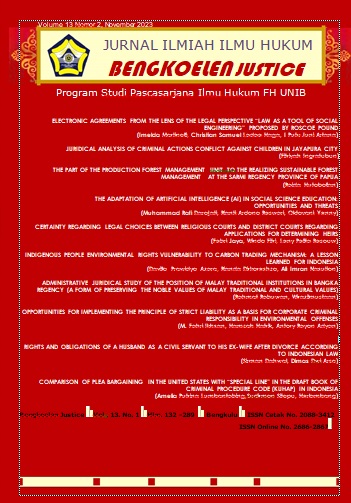Main Article Content
Abstract
In accordance with the research title listed above, Indonesia has three legal systems that
regulate inheritance, namely; Islamic inheritance law which is based on and uses the holy book
Al-Quran as its source, western civil inheritance law which originates from Burgerlijk Wetboek
(hereinafter referred to as the Civil Code), and finally customary inheritance law based on the
customs of the community itself, this cannot be separated from from the role of each court that
handles it. Therefore, the author needs to conduct research on the certainty of legal choices
between religious courts and district courts regarding applications for determining heirs. The
aim of the research is to analyze the role of the district court and religious court in the
application for determining heirs, after that this study will also analyze how legal certainty is
provided regarding the legal choice between the district court and the religious court. The
results obtained from this research are that the implementation of Law no. 50 of 2009 regarding
every application for determining Islamic heirs must be handled and under the authority of a
religious court, in fact this does not mean that the district court is of the opinion that it no
longer has the right and authority to adjudicate applications for inheritance, this is because the
authority possessed by the district court still has power. law in an effort to adjudicate
applications for determining inheritance for Muslims. However, what needs to be underlined is
that the difference between religious courts is that when it comes to resolving inheritance cases,
religious courts are guided by the complications of Islamic law, while district courts are based
on the Civil Code, namely western law.
Keywords:District Court, Religious Court, Inheritance, Petition, Determination
Article Details
Copyright (c) 2023 Febri Jaya, Winda Fitri, Leny Pelita Besouw

This work is licensed under a Creative Commons Attribution-ShareAlike 4.0 International License.

Ciptaan disebarluaskan di bawah Lisensi Creative Commons Atribusi-BerbagiSerupa 4.0 Internasional.
